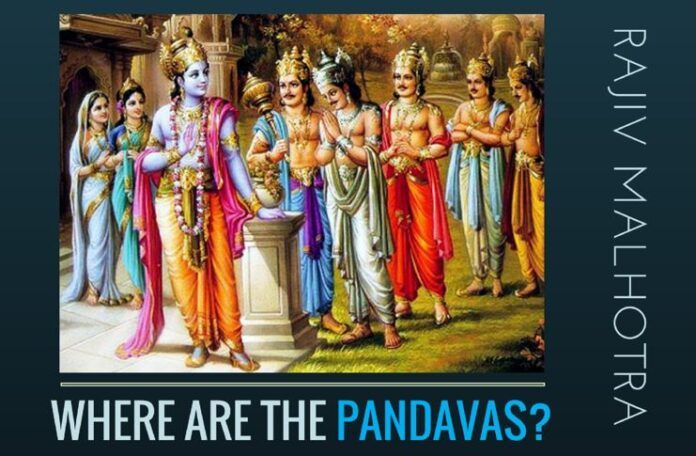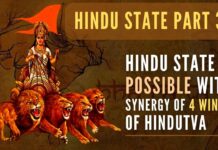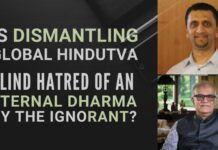
[dropcap color=”#008040″ boxed=”yes” boxed_radius=”8px” class=”” id=””]T[/dropcap]he Hindu re-awakening movement must improve its game in the intellectual Kurukshetra. Unfortunately, we suffer from a deficiency of competent scholars and institutional mechanisms. Hindus are often being represented by substandard voices. Emotional bombast and political patronage are depleting prana and overshadowing vigour and originality. The paucity of internationally competitive fresh Hindu research has many causes. The chief one is the belief that “everything has already been written”. Such persons hide their laziness behind one-liner wisdom and cronyism, instead of pursuing merit and professionalism.
The critics failed to notice that ‘Breaking India’ focuses on exposing many present-day individuals and organisations that did not even exist fifty years ago.
A typical example of this syndrome happened just a few days back. Two of my books (‘Breaking India’ and ‘Being Different’) were attacked by some middle-ranking Hindu leaders on a bizarre allegation: that fifty years ago some prominent Hindus had already written books that were “exactly same” as mine, thereby making all my work redundant and counterproductive. The critics failed to notice that ‘Breaking India’ focuses on exposing many present-day individuals and organisations that did not even exist fifty years ago. And the insights explained in ‘Being Different’ are fresh compared to the supposedly “same” books written in a bygone era. The critics were satisfied with superficial similarities without any interest (or ability) to look deeper. Such turf protection is a form of tribalism driven by personal insecurity and ambition. The best way to respect our past great thinkers is not by worshipping their old books, but by continuing their parampara with fresh research outputs in response to today’s Kurukshetra. The clash of civilisations is becoming ever more complex, and the playing field has certainly not been frozen for the past fifty years. Our tradition was built on very high standards of intellectual excellence. But today there is a cacophony of voices of individuals who barely read serious material – forget about original writing. I have also heard some senior Hindu leaders flippantly dismiss the need for fresh research and intellectualism. It amazes me that retrograde voices can climb up in some Hindu organisations.
[dropcap color=”#008040″ boxed=”yes” boxed_radius=”8px” class=”” id=””]H[/dropcap]indus must invest in serious investigative work. This includes the revival of the tradition of purva-paksha methods for debating opponents in a respectful manner. We must re-educate the so-called “educated class”, with the use of game-changing discourse. We must encourage self-critiques rather than wasting time at the “feel good” gatherings of “like-minded people”.
Resource allocations and appointments should be merit based and not driven by loyalty to leaders.
Resource allocations and appointments should be merit based and not driven by loyalty to leaders. Anyone appointed to lead a “think tank” should have already excelled in thinking, which means having a track record of high impact publications. The new government is conspicuous by its absence in the theatre of civilisation discourse. The is no strategic coherence across its Byzantine maze of departments. Fortunately, the Indian Left is also in disarray. The new technology subverts their monopoly over Hinduphobic knowledge production and distribution. There is a growing display of Hindu emotional activity in social and mass media, as well as the emergence of many conclaves featuring some Hindu voices. This powerful emotion needs to be harnessed and redirected to create an intellectual ecosystem that is globally competitive.
The writer is the author of the book ‘Academic Hinduphobia’. Portions of this article appeared in DNA India.
Join Rajiv Malhotra for his FB LIVE Broadcasts
Follow Rajiv on facebook.com/RajivMalhotra.Official
- Part 2: Discussion between Dr. Swamy and Rajiv Malhotra - September 10, 2017
- Dr Subramanian Swamy In Conversation with Rajiv Malhotra - July 24, 2017
- P2 – Discussing the Digestion of Yoga with a White Hindu - July 3, 2017











Just be yourself,in contexts and processes of legacy and the DNA of the cosmos. The backlash of the game of underpinning the intellectual and culturally rich Hindus,is on the verge of extinction.The emergence of the new atma is and will be a reality to witness. The younger pandavas are the nextG with the right mix of mathematics and Sanskrit, in the changing canvas!
Can you please use a condensed version of ‘ biography’ of Rajiv Malhotra if you must ‘every time’ in these articles.
Can you please use a condensed version of ‘auto biography’ of Rajiv Malhotra if you must ‘every time’ in these articles.
The learned author could have pointed out to other fields to assert Hindu leadership in addition to reading books and understanding newer ideas there by.
It is a fact of life that the newer generations have less patience for long winded writings or speeches, can’t the presentations be condensed and to the point, details to be presented only for further discussion/debate?
Can we blame the reader if he tends to skip portions of a long history given in ONE article, which should have constituted a book.
Lastly Hindus waste lots of time/patience/energy by debating finer philosophy with fundamental brainwashed one track minded persons just like playing flute to a buffalo.
I am of the firm view that Hindu will always lose in an intellectual argument on who is greater, Krishna or Christ instead of meeting him on his own ground and expose the hypocrisy/falsehood/double speak of his points of reverence.